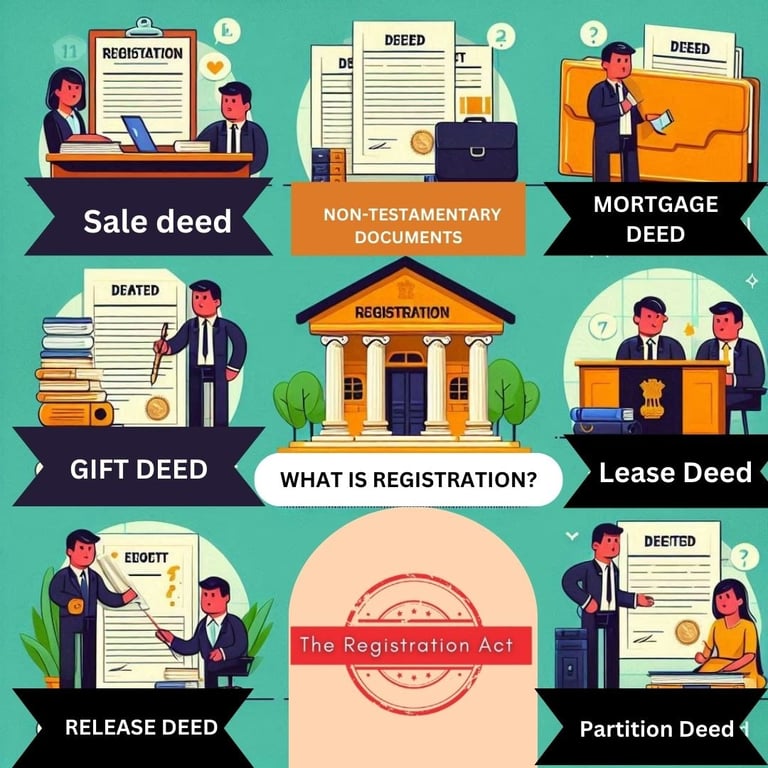Importance of Registration Act in India
Parmar Vishal Maheshbhai
Anand College Of Legal Studies
This blog is written by Parmar Vishal Maheshbhai, a Law Graduate of Anand College of Legal Studies


INTRODUCTION
In India very few people know the importance of the Registration Act, also the people are not very aware, and they are not familiar with the concept of registration, they still do not understand how much importance the law has, which can cause some issues for them. People must become more familiar with the concept of registration so that the law gives them some protection from any property disputes.
WHAT IS REGISTRATION?
Registration is the recording of a document with their authorized officer (registrar officer), and they secure copies of the original document.
WHICH DOCUMENTS NEED TO BE REGISTERED COMPULSORY TO AVOID PROPERTY DISPUTES? (SECTION 17)
In India, the Registration Act mandates the registration of some documents for their legal value and security. Registration is required for the following documents:
· GIFT DEED
It is a legal document for transferring the ownership of immovable property without any consideration amount.
· NON-TESTAMENTARY DOCUMENTS
This document is used to create or declare a particular thing or show some limits, whether in the present or the future, to any right, title, or interest on the immovable property.
· LEASE DEED OR RENT DEED
This legal document is created between two parties, the first party is known as the lessor, and the second one is the lessee. The first part allows the second one to use their property rights for a specific period.
· SALE DEED
A document that is used to transfer legal ownership of property from seller to buyer.
MORTGAGE DEED OR RELEASE DEED
A mortgaged deed is used to create some property interest, and banks keep this legal document as security for a loan, and the release deed is executed to claim ownership of the property once they have paid the full amount of the loan.
· AGREEMENT TO SALE
An agreement to sale is a legal document that is executed between buyers and sellers for their acceptance of the conditions they create.
WHICH DOCUMENTS IS NO NEED TO BE REGISTERED COMPULSOREY (SECTION 18)
The following documents do not need to be registered. But a person can register their documents to give some legal protection to the document.
· WILLS
If a person decides to distribute their own property and assets to their legal heirs after their death, then they create a legal document called a will.
· LEASES OF IMMOVABLE PROPERTY
Leases no need to register if the time-period is less than one year.
· TRUST DEEDS
If a person owns some moveable assets and they want to give their ownership rights to others, they create a legal document for that, which is called a trust deed.
· POWERS OF ATTORNEY
A general power of attorney is a legal document that is executed from one person to another for the purpose of giving some rights or acting on behalf of them. And they do not need to be registered, but a special power of attorney must be registered.
· PRIVATE AGREEMENTS
Private agreements do not include any property or land transfer; they are only created for their own understanding purposes.
WHAT LANGUAGE IS CONSIDER FOR THE REGISTRATION?
A document needs to be created in a language that is simple, district-friendly, and more stable. As per the Registration Act 1908, the authorized person (sub-registrar) has power to refuse the document if it is not in a language that is not used in the district and not in an understandable manner. One of the main things is that missing some important points can lead to a non-registrable document, and it can also create some property disputes in the future.
TIME LIMIT FOR REGISTRATION?
According to the Registration Act Section 23, any legal property document must be presented to the sub-registrar for their registration. To prevent any future property-related disputes, any legal documents must be executed within four months.
WHAT IF DOCUMENT CAN NOT BE REGISTERED IN THE PRESCRIBED TIME LIMIT?
In case a document is not submitted for registration within the four-month period, but the delay is not significant, then a written application can be sent to the Sub-Registrar.
PENALTIES
Section 17 clearly says that every legal document must be registered. If a person cannot register their legal document, it cannot be used as evidence in court. Also, they cannot create any title or interest in property.
CONCLUSION
The Registration Act of 1908 plays an important role in protecting our property rights and preventing some property-related disputes. Compulsory registration is given to such kinds of legal protection to documents like gift deeds, sale deeds, lease deeds, mortgage deeds, and agreements to sell. And documents like wills, leases (less than a year), and private agreements do not need compulsory registration, but still, they can get some benefits for adding some legal security. in India Many people are not familiar with the importance of the Register Act of India, which creates many problems about property ownership.
REFRENCES
1) Legal authority, Avinash Kumar Chauhan vs Vijay Krishna Mishra (2009) https://www.legalauthority.in/judgement/avinash-kumar-chauhan-vs-vijay-krishna-mishra-12331 visited on 07/09/2024.
2) Indiankanoon.org, M.L. Aggarwal vs Orient Syntex Ltd. (1987) https://indiankanoon.org/doc/64495/ visited on 07/09/2024.
3) Casemine, Smt. Rukmani v. V. Rajanna (2006) https://www.casemine.com/judgement/in/5ec958d49fca19475fcc79f8 visited on 12/09/2024.
4) Thelaws, K.K. Verma v. Union of India (2003), https://www.the-laws.com/Encyclopedia/Browse/Case?CaseId=317991430100&Title=K-K-VARMA-AND-CO-Vs.-UNION-OF-INDIA visited on 12/09/2024
Lawfyi, Ganga Saran v. Jai Narain (1950)https://lawfyi.io/ganga-bishan-and-ors-vs-jai-narain-on-19-november-1985/ Vis
